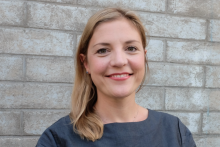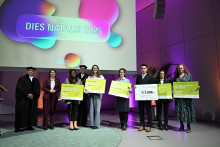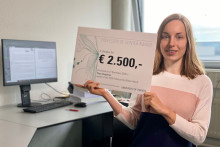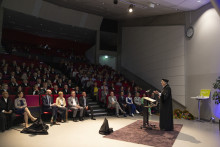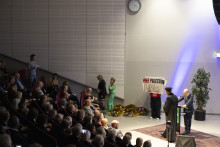Florence Metz is extremely happy with the award. According to her, the timing is more than right. Metz gave birth to her second son three months ago and is on maternity and parental leave until the end of July 2024. 'I'm in a completely different world for a while now. I owe the fact that I won this award mainly to my colleague Le Anh Nguyen Long. She sent me an email, asked if I had received the information about the Professor de Winter Prize and motivated me to submit my research. Great! Colleagues who believe in you and know how to encourage you at the right time, that's what you need as a scientist in your career and that's what you wish for everyone.’
A quiet continuation of her maternity leave is not in the cards for Florence Metz for the time being. She has now also reached the first round of an ERC Grant. 'My proposal has been positively evaluated. I am now preparing for a personal interview in June.'
Government and decision-making
Through her research, Metz aims to contribute to more sustainable policy outcomes. She studies public policy design and the social mechanisms behind decision-making. Collaborative governance and its impact on policy is a fascinating area of research for her. ‘I study collaboration in political networks and use social network analysis to make sense of political decisions.’
Her research is timely and highly relevant. Metz: 'We live in a world with unprecedented problems and issues; the climate crisis, environmental problems and land degradation, to name a few. In the most ideal situation, the market or society solves a problem itself. If that fails, the government intervenes. That plays an important role in crises.' The energy crisis also has her full attention. Metz recently contributed to an article that appeared in Science Magazine. The piece analyzes why countries react so differently to energy crises, such as the crisis caused by the war in Ukraine.
Polder model
The Professor de Winter Prize winner compared our political system to countries such as Germany, France and Switzerland, and focused on the question of how to reduce micropollutants in water. For this case, the Netherlands mainly choose a voluntary approach. Switzerland went for a technological approach. Looking at the political system and its’ ability to reach agreement across different interests, she concludes that the Netherlands is doing well. 'The multitude of parties can make it difficult to reach agreement. But once it is found, it is often a long-term solution.'
Covid
In Covid times, Metz conducted research on the role of science in the COVID-19 pandemic, a project funded by ZonMw. Among other things, the project was about developing a corona dashboard. 'My project partners developed a model based on the travel movements from village to village and were able to predict infections based on mobility of the inhabitants. For me as a social scientist, it was very interesting to participate in something that did not yet exist. I learned a lot about crisis management and our political system.’
Science language
It is often difficult to communicate research and results to a large audience, Metz notes. If it were up to her, there would be much more focus on this in the near future. 'Academics have their own language, which often is too codified for the general public. As scientists we must work towards different types of communication products in collaboration with communication experts or journalists.’
According to Metz, just opting for more accessible language in scientific articles alone is insufficient. 'If we want to bring our science into the limelight better, we must choose other forms of expression more often. A blog, a YouTube video or a podcast are important products that can be used to convey our scientific message. We need to be more aware of that.’
FLORENCE METZ
Florence Metz is Assistant Professor of Governance Resilience at the University of Twente. She has a background in political science and public policy and her research focuses on the policies governments adopt and why they do so. She studies the politics of sustainability transitions by analyzing political actors and their interactions in policy processes.
Metz is one of the authors of the article "Why nations lead or lag in energy transitions," published in the most recent issue of Science Magazine. This examines how governments in Western democracies respond to disrupted energy markets and why they adopt different strategies when it comes to the energy transition.


